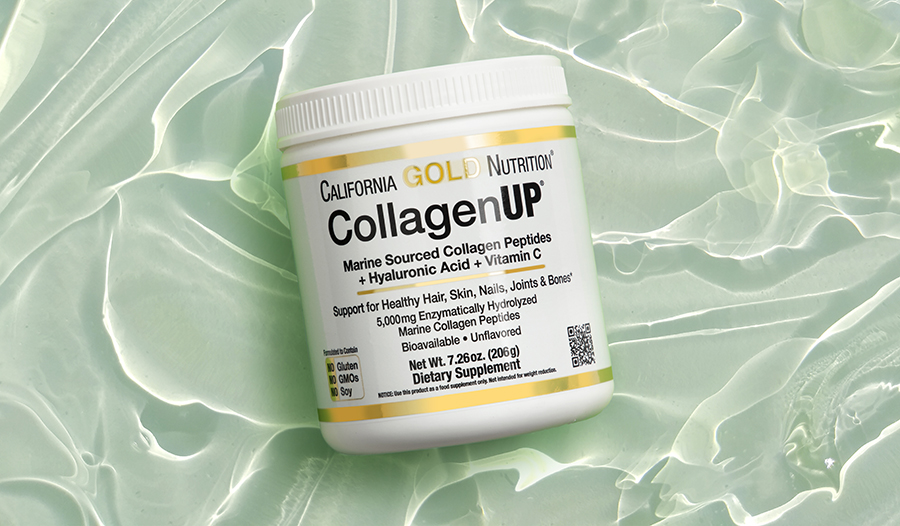Miért lehet a tengeri kollagén jobb megoldás az Ön számára

Miért a kollagén?
Kollagénkiegészítők segítenek támogatni a különböző testrendszereket, struktúrákat és funkciókat. A szív egészségétől a csontok egészségéig a tengeri kollagén elősegíti az egészséges izmokat, az erős inakat, a fiatalos bőrt, az egészséges bélnyálkahártyát és az ízületi fájdalom javítását.
A kollagén számos egészségügyi előnye annak tulajdonítható, hogy ez a szervezet legelterjedtebb fehérje. Az inakban, szalagokban, csontokban, szervekben, erekben, izmokban, bőrben és belekben található kollagén nagyon fontos szerepet játszik az emberi test számos területén. A víz után a kollagén a második legelterjedtebb anyag a szervezetben.
Mitől különbözik a tengeri kollagén?
Fenntarthatóbb
Tengeri kollagén a halak eldobott bőréből és pikkelyeiből készül, így számos más kollagénforrás fenntartható alternatívája.
Ez pescatáriánus barát
A kollagénkiegészítők jellemzően tehenekből (szarvasmarhafélék), csirkékből vagy sertésekből (sertés) származnak. Mivel a tengeri kollagén halból származik, kiváló lehetőség azok számára, akik pescatárius étrendet követnek.
Jó fehérjeforrás
18 különböző aminosavat tartalmazó tengeri kollagén kiváló fehérjeforrást kínál. Mivel a kilenc esszenciális aminosavból csak nyolcot tartalmaz, nem teljes fehérjeforrás. Az esszenciális triptofán aminosav hiányában a tengeri kollagén, bár hiányos, mégis életképes forrása a testünk fehérje- és kötőszöveteinek építőelemeinek.
Hogyan készül a tengeri kollagén?
Miután a kollagént kivonják a hal bőréből és pikkelyeiből, hidrolizálódik, hogy a kollagénfehérjéket kisebb darabokra bontjuk, úgynevezett kollagénpeptidekre. A peptideket a szervezet könnyebben emészti, növelve az egészségügyi előnyöket a fokozott felszívódás és a biohasznosulás révén. A hidrolízis csökkenti a tengeri kollagénhalszagát és ízét is.
A képződött kisebb peptidek jobban oldhatóak, és könnyen keveredhetnek turmixba, kávéba, gyümölcslevébe vagy bármilyen választott italba. Az emésztőrendszer tovább bontja a kollagén peptideket aminosavakká, így a szervezet felhasználhatja őket a sok kollagénnel töltött helyen.
8 A tengeri kollagén egészségügyi előnyei
A kollagén az emberi szervek és szövetek alapjainak nagy részét képezi, a tengeri kollagén kiegészítése számos egészségügyi előnnyel járhat. Tekintettel arra, hogy testünk kevesebb kollagént kezd termelni a 20-as évek közepétől, a kollagénbevitel növelése segíthet enyhíteni néhány gyakori egészségügyi problémát, amelyek az öregedés előrehaladtával csökkent kollagéntermeléssel járnak.
A tengeri kollagén javíthatja az ízületek egészségét
Ahogy öregszünk és kevesebb kollagént termelünk, porcunk érintett. A kollagén a porc nélkülözhetetlen összetevője, segít fenntartani szerkezetét és integritását. Az ízületi betegségek, például az osteoarthritis kialakulásának kockázata az öregedéssel növekszik, kevesebb kollagént termelve.
Tanulmányok azt mutatják, hogy a tengeri kollagénkiegészítő szedése segíthet csökkenteni az ízületi fájdalmat és javítani az osteoarthritis tüneteit. A kutatók ezt annak az elképzelésnek tulajdonítják, hogy a kollagén stimulálhatja a porcszövetet, hogy több kollagént termeljen, miután felhalmozódott a szövetben, mivel a kollagén stimulálja a testet fibroblasztok - sejtek termelésére, amelyek elősegítik a kollagéntermelést.
A tengeri kollagén jótékony hatással van a bél egészségére
Nagy mennyiségű prolin, glutaminés glicin-tengeri kollagén előnyös a gyomor és a belek számára. Ezek az aminosavak létfontosságú szerepet játszanak az egészséges bélnyálkahártya fenntartásában.
Szivárgó bél szindróma akkor fordulhat elő, ha a bélnyálkahártya károsodott. Ez lehetővé teheti az élelmiszerrészecskék és a hulladék kiszivárgását a bélből és átjutását a véráramba. A szivárgó bél tünetei közé tartozhatnak gáz, puffadás, ételérzékenység, és irritábilis bél szindrómához (IBS) vezethetnek.
A tengeri kollagén szedése segíthet a bélnyálkahártya helyreállításában, és javíthatja a szivárgó bélszindrómával és más gyulladásos bélbetegségekkel (IBD), például a Crohn-kórral és a celiakiával járó tüneteket.
A tengeri kollagén segít támogatni az öregedő bőrt
A bőr hidratálását, integritását és rugalmasságát egyaránt befolyásolja az egészséges kollagénszint. A kollagéntermelés csökkenése az öregedéssel finom vonalakhoz, ráncokhoz és száraz bőrhez vezet.
Tanulmányok azt mutatják, hogy a kollagénkiegészítőket szedő nőknek fokozott a bőr rugalmassága és csökkent a bőr szárazsága, mint azoknál, akik nem szedtek kollagént. Más kutatások azt találták, hogy azok a nők, akik kollagénkiegészítőt szedtek, jelentősen csökkent a ráncok, mint azok, akik nem vették be a kollagént.
A kollagén bőrre gyakorolt előnyei annak köszönhetők, hogy képes stimulálni a fibroblasztok növekedését, ezáltal növelve a szervezet kollagéntermelését. A kollagén stimulálhatja a elasztin és a fibrillin, más jelentős fehérjék növekedését is, amelyek jelen vannak a bőrben.
A tengeri kollagén javíthatja az izomtömeget
A glicin, a tengeri kollagénben jelen lévő aminosav segíthet növelni az kreatin szintet, amely létfontosságú izomfehérje. Az izomszövet legfeljebb 10% -a kollagén, amely segít az izmok erősségének és működőképességének megőrzésében.
Egy tanulmány kimutatta, hogy azok a férfiak, akik testmozgást követve kollagénkiegészítőket szedtek , lényegesen nagyobb erőt és izomtömeget nyertek, mint azok, akik nem vették be a kollagént. Egy másik tanulmány kimutatta, hogy azok, akik az öregedés vagy szarkopénia miatt elvesztették az izomtömeget, kollagénkiegészítéssel növelték az izomtömeget.
A tengeri kollagén segít megőrizni az izomtömeget azáltal, hogy minimalizálja az izomlebomlást. További előnyökkel jár a prolin, a kollagén aminosav antioxidáns tulajdonságai, amelyek segíthetnek csökkenteni a fájdalmat és az edzés okozta sejtkárosodást, javítva az edzés utáni helyreállítást.
A tengeri kollagén segíthet az inak és a szalagok támogatásában
Az inak és a szalagok elsősorban kollagénszálakra épülnek. Tanulmányok azt mutatják, hogy a kollagénkiegészítők szedése javíthatja az ínsérüléseket. Amikor a szalagok vagy inak megsérülnek, testünk több kollagént termel, hogy elősegítse azok helyreállítását.
A kollagénkiegészítők szedése elősegítheti a testet több kollagén termelésére, ezáltal javítva a sérülések helyreállítását.
A tengeri kollagén támogatja az egészséges csontokat
Hasonlóan a szalagokhoz és az inakhoz, a csontok elsősorban kollagénből állnak. A kollagén adja a csontok szerkezetét, és jelentősen hozzájárul a csontok szilárdságához és sűrűségé
Tanulmányok azt mutatják, hogy a kollagénkiegészítők szedése segíthet csökkenteni a csontvesztést, amely csontritkuláshoz vezethet. További kutatások azt mutatták, hogy a kollagénkiegészítőket szedő nők növekedést tapasztaltak a csontásványi sűrűség (BMD) -hoz képest azokhoz képest, akik nem szedték a kiegészítőt. Az alacsony BMD korrelál az osteoporosis kialakulásával.
A tengeri kollagén támogatja az egészséges hajat és a körmöket
Egy kutatási tanulmány azt mutatja, hogy a kollagén peptidekkel történő orális kiegészítés csökkenti a törékeny körmök tüneteit és javítja a köröm növekedését.
Ez a tanulmány azt is megállapította, hogy a kollagén szedése elősegítheti a hosszabb haj- és körömnövekedést.
A tengeri kollagén elősegíti a szív egészségét
A kollagén kritikus fontosságú az artériafalaink integritása és szerkezete szempontjából. Az artériák olyan erek, amelyek oxigénnel ellátott vért szállítják a szívből, hogy oxigént és tápanyagokat szállítsanak a test szöveteibe.
A kollagén csökkenése az öregedéssel hozzájárulhat az artériák gyengüléséhez, hozzájárulva az ateroszklerózis kialakulásához vagy az artériák szűküléséhez. A szívroham és a stroke kockázata növekszik az érelmeszesedéssel.
Egy tanulmány megállapította, hogy azok, akik naponta kollagént szednek, jelentősen csökkent az artériák merevsége, mint a kezdete előtt. Ezek a tanulmány résztvevői növelték HDL- vagy jó koleszterinszintjüket is, ami csökkenti az ateroszklerózis kockázatát.
The Bottom Line
Tele aminosavakkal,, a fehérje építőelemeivel, tengeri kollagén optimális kiegészítő, amely számos különböző testszerkezet és rendszer számára előnyös lehet.
Mivel képes erősíteni a bélnyálkahártyát, a hajat és a körmöket, miközben segít fenntartani a csont- és izomtömeget, a tengeri kollagén széles körű egészségügyi előnyökkel jár. Segíthet az artériáknak megőrizni szerkezetüket és bőrüket fiatalos megjelenésének megőrzésében.
A szalagok és inak előnyei vannak a kollagénből - különösen sérülés esetén. Ahogy az osteoarthritis kockázata az életkorral növekszik, a kollagéntermelés csökken, így a tengeri kollagénkiegészítés ideális azok számára, akik ebben a fájdalmas állapotban szenvednek.
A tengeri kollagén biztonságos kiegészítőt kínál a legtöbb ember számára, akiknek kevés mellékhatása van. Néhányan enyhe mellékhatásokról számoltak be, beleértve a teltségérzetet, a gyomorégést és az elhúzódó rossz ízt. Azoknak, akiknek ételallergiája van a halra vagy a tojásra, kerülniük kell az ezekből az összetevőkből készült kollagénkiegészítőket.
Referenciák:
- Bello AE, Oesser S. Kollagén hidrolizátum osteoarthritis és egyéb ízületi rendellenességek kezelésére: az irodalom áttekintése. Curr Med Review. 2006; 22 (11) :2221-2232. doi:10.1185/030079906x148373
- Clark KL, Sebastianelli W, Flechsenhar KR és mtsai. 24 hetes tanulmány a kollagén hidrolizátum étrend-kiegészítőként való alkalmazásáról aktivitással kapcsolatos ízületi fájdalommal küzdő sportolóknál. Curr Med Reference 2008; 24 (5) :1485-1496. doi:10.1185/030079908x291967
- Moszkowitz RW. A kollagén hidrolizátum szerepe a csont- és ízületi betegségekben. Semin Arthritis Rheum. 2000; 30 (2) :87-99. doi:10.1053/sarh.2000.9622
- Proksch E, Segger D, Degwert J, Schunck M, Zague V, Oesser S. A specifikus kollagén peptidek orális kiegészítése jótékony hatással van az emberi bőr fiziológiájára: kettős vak, placebo-kontrollos vizsgálat. Skin Pharmacol Physiol. 2014; 27 (1) :47-55. doi:10.1159/000351376
- Ganceviciene R, Liakou AI, Theodoridis A, Makrantonaki E, Zouboulis CC. A bőr öregedésgátló stratégiák. Dermatoendokrinol. 2012; 4 (3) :308-319. doi: 10.4161/derm.22804
- Gillies AR, Lieber RL. A vázizom extracelluláris mátrixának szerkezete és funkciója. Izomideg. 2011; 44 (3) :318-331. doi:10.1002/mus.22094
- Zdziblik D, Oesser S, Baumstark MW, Gollhofer A, König D. Kollagén peptid kiegészítés rezisztencia-edzéssel kombinálva javítja a testösszetételt és növeli az izomerőt idős szarkopin férfiaknál: randomizált, kontrollált vizsgálat. JJ 2015. június; 114 (8) :1237-1245. doi:10.1017/S0007114515002810
- Hexsel D, Zague V, Schunck M, Siega C, Camozzato FO, Oesser S. Az orális kiegészítés specifikus bioaktív kollagén peptidekkel javítja a köröm növekedését és csökkenti a törékeny körmök tüneteit. J Cosmet Dermatol. 2017; 16 (4) :520-526. doi:10.1111/jocd.12393
- König D, Oesser S, Scharla S, Zdziblik D, Gollhofer A. A specifikus kollagén peptidek javítják a csontok ásványi sűrűségét és a csontmarkereket a posztmenopauzális nőknél - randomizált, kontrollált vizsgálat. Tápanyagok. 2018; 10 (1) :97. Közzétéve: 2018. január 16. doi:10.3390/nu10010097
- Elam ML, Johnson SA, Hooshmand S és mtsai. A kalcium-kollagén kelát étrend-kiegészítő enyhíti a csontvesztést osteopeniában szenvedő posztmenopauzális nőknél: randomizált, kontrollált vizsgálat. J Med Food. 2015; 18 (3) :324-331. doi:10.1089/jmf.2014.0100
FELELŐSSÉGKIZÁRÓ NYILATKOZAT:A jelen blognak nem célja diagnózis felállítása...

















































































 Tartalomjegyzék
Tartalomjegyzék
















